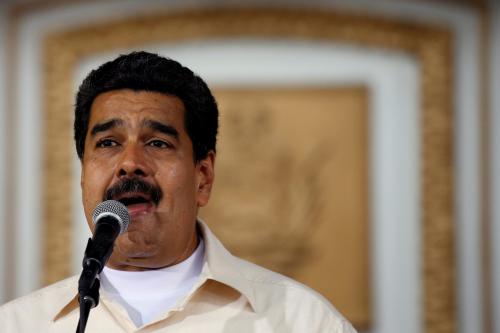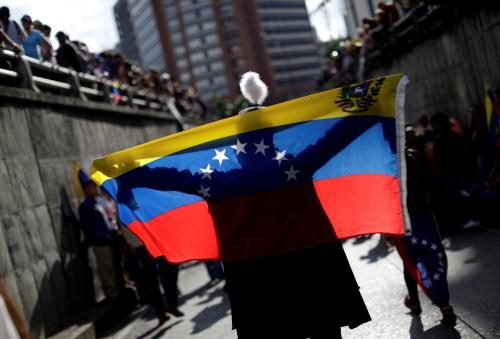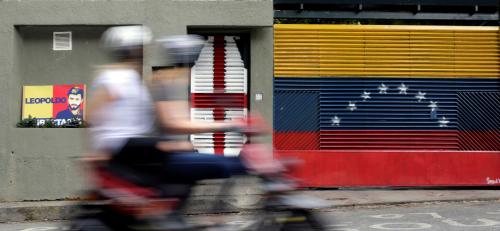In 2006, Hugo Chavez requested that the Venezuelan National Assembly—at the time controlled by Chavez’s party—approved a bill modifying the country’s national symbols. The bill mandated, for example, that the white horse on the Venezuelan coat of arms be facing to the left rather than the right. Introducing the new national symbols cost the country large sums of money and took years to be implemented.
But the current Venezuelan regime confirmed in mid-December of 2016 that they are able to make even more bizarre decisions. President Nicolás Maduro decided to ban and take the 100-bolívar notes out of circulation 72 hours after the announcement. Chaos took over the country.
Venezuelans with bank accounts waited long hours in line to deposit boxes with large amounts of expiring bills. People with no access to banking, however, tried to exchange their 100-bolívar notes—each worth about 2 to 3 cents of a U.S. dollar at the time—for others ones of lower denominations (of course, this was an almost impossible task given that the expiring bills account for over 70 percent of cash in the country, and therefore there were simply not enough smaller bills in circulation for this exchange to be effective). As the deadline approached, and the new 500-bolívar notes—supposedly on their way to Venezuela from a printing press abroad—did not arrive on time, Maduro changed his mind and postponed the expiration date of the bills to January 2, 2017.
But, guess what? Just before the end of the year, when it was obvious that the new bills would not arrive on time, again, Maduro decided to extend the deadline, again. The new deadline is January 20, 2017.
In a country that runs very much on cash because of the need to buy food, medicines, and other basic goods on the black market as shortages are rampant in price-controlled establishments, this measure is beyond unreasonable. The original motive behind this absurd decision is that, according to Maduro, “mafias” in Colombia and in other countries are stockpiling these bills and using them to buy price-controlled goods in Venezuela as part of the “economic war” that the world elites are waging against Venezuela. Of course, the fact that the new higher denomination bills did not arrive on time is also, according to the government, part of the “international economic sabotage” against the country. As usual, there is no evidence whatsoever of these and other claims by Maduro. And no evidence will ever be found, because no one in their right mind would stockpile currency from a country in hyperinflation, regardless of the denomination of the bills.
In the meantime, the country is suffering a massive cash crunch given that large amounts of these expiring bank notes are already out of circulation, with many of its citizens—especially the poorest of the poor—losing the only money they had to survive through the ongoing unprecedented humanitarian crisis brought on by this same government. The sharp reduction in the monetary supply has apparently resulted in a growth slowdown in prices. But these figures are nothing but fake and illusory: Without cash there is no consumption, and without consumption there is no inflation. Similarly, the recent drop in the black market foreign exchange rate is also a temporary result of this fake liquidity crunch, as there are less bolívares available to buy U.S. dollars.
No one really understands the rationale of this intended cash crunch or what is behind such a highly unpopular measure by a government that is already highly unpopular to begin with. The National Assembly, controlled by the weakened opposition leadership, which many Venezuelans feel has betrayed them after establishing an unfruitful dialogue with the government, has no ability to fix the situation either.
It is also hard to foresee how this measure could play into the political, social, and economic dynamics in the country. Reports on looting and civil unrest in large cities has become more and more common throughout the country, often repressed by the National Guard.
It looks like in the new year things will continue to get worse before they get better. As the humanitarian crisis keeps worsening, the government will keep playing the blame game. With that, damaging policies will continue: Money printing will resume, sooner rather than later, given the large fiscal deficit and Venezuela’s de facto isolation from global financial markets. In the absence of the recovery in oil prices, this isolation will become more real in 2017, causing further devaluation of the bolivar, making it harder to import food, medicines, and other basic goods. With it, the likelihood of Venezuela’s government and PDVSA—the state-owned oil company—defaulting on their debt will continue to increase.
Ultimately, without a government change in sight, Venezuelans’ hope for a better future will remain eclipsed by Maduro and his destructive policies.






Commentary
Venezuelans’ wishes for 2017: food, medicines, and cash
January 3, 2017